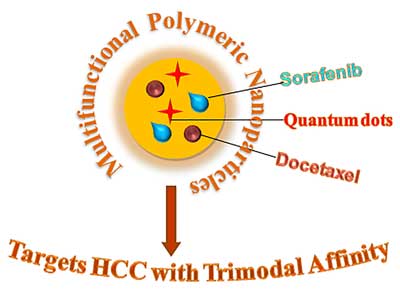|
epatocellular carcinoma (HCC) is the most common type of primary liver cancer and one of the most aggressive and vascularized cancers. Due to poor drug penetration, poor bioavailability, non-specificity and drug resistance, many current chemotherapies have failed to achieve effective therapeutic targets in solid tumors-this is a challenging aspect in this area.
|
|
In order to find new methods, researchers at the Indian Institute of Technology in Mumbai, India have developed multifunctional polymer nanoparticles for HCC. This single nanoplatform method holds the approved Indian patents (Poojari, R., Panda, D and Srivastava, R. Multifunctional polymer nanocarriers. Indian Patent No. 317866, (2019)).
|
|
These biocompatible multifunctional polymer nanoparticles have a three-peak affinity for targeting microtubules, tyrosine kinases and quantum dots in a highly sensitive imaging system.
|
|
The researchers studied the intracellular interaction of multifunctional polymer nanoparticles in HCC cells.
|

|
|
Multifunctional polymer nanoparticles for liver cancer treatment. (Image: Department of Bioscience and Bioengineering, Indian Institute of Technology, Mumbai)
|
|
In-depth studies have shown that this multifunctional polymer nanoparticle morphology can lead to effective anti-proliferation, apoptosis, anti-angiogenesis, microtubule binding and anti-mitotic activity compared to single drug monotherapy in HCC cells. It strongly inhibits the expression of tyrosine kinase in HCC cells. This multifunctional system shows the real-time high sensitivity of quantum dots in HCC cells.
|
|
The lead author of the research paper, Dr. Radhika Poojari, said: "The potential application of multifunctional polymer nanoparticles in safe and more effective liver cancer treatment is acceptable ( nanomedicine , " through inhibition Microtubules and tyrosine kinase, anti-hepatoma activity of multifunctional polymer nanoparticles "). ).
|
|
In vivo studies of multifunctional polymer nanoparticles in the HCC model are still needed . The research team hopes to cooperate with biopharmaceutical companies to realize the technology transfer of synthetic preparations.
Source of information Nanowerk
|




